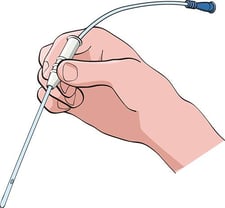If you feel a burning pain when you pee, you might have a bladder infection. Most people who use catheters have experienced this unwelcome condition at least once, and it's tiresome to know that you most likely will get another one later on.
But there are ways to avoid UTIs. Here are the best tips from some real experts— the European Association of Urology Nurses.

What causes a UTI?
Many of the bacteria that cause a catheter-associated urinary tract infection are common in the intestines, but usually do not cause an infection there. These bacteria can enter the urinary tract when the catheter is being inserted, and a UTI occurs when bacteria has a chance to grow and multiply in the urethra and bladder, and start cause symptoms.
How do I prevent UTIs?
- Keep the bladder pressure low by emptying your bladder regularly and completely. There are different kinds of medication for high pressure in the bladder. Talk to your doctor about this.
- If you have no spontaneous voiding, there is a need to catheterize 4–6 times daily.
Drink enough fluid to maintain a urine output of at least 1200 ml per day.
Excessive fluid intake increases the risk of bladder over distension and incontinence. - Constipation can interfere with bladder emptying due to pressure from the rectum caused by a full bowel. Adjustment of fiber and fluid intake may be needed. Increased physical activity might have a positive effect.
- Hands are the main pathway of bacteria transmission. Wash your hands thoroughly with soap and water before the catheterization. To avoid contaminating the catheter tube, you can also use specially designed catheters with an included insertion aid, allowing a non-touch technique. You should not touch anything between washing your hands and before touching the catheter.

- Wash your genital area once a day and do not use soap with perfume or high pH. It is also important to wash your genitals after incontinence episodes of urine or feces.
To reduce the use of condoms and incontinence pads, anticholinergic drugs can help. Speak to your nurse, home care nurse or doctor about this.
To learn more about UTIs—what causes them and how to prevent them— download this extensive EnCATHopedia about Urinary Tract Infections. And don't miss the last blog post about UTI: How do I know that I have UTI.




